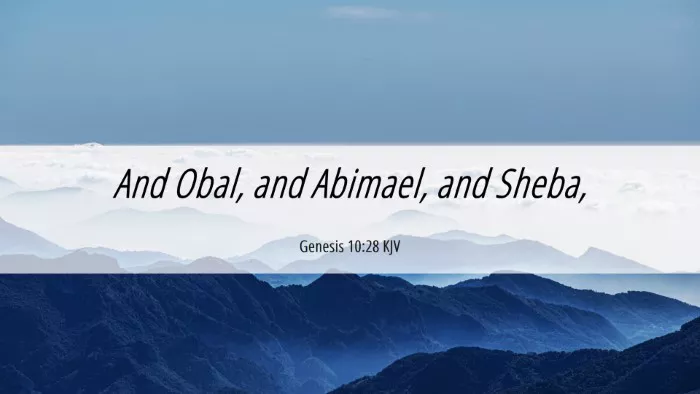Read the Daily Bible Verse Genesis 10:28 To Strengthen Your Spiritual Journey.
Genesis 10:28 (KJV):
“And Obal, and Abimael, and Sheba,”
Genesis 10:28 KJV Background
Genesis 10:28 is a verse nestled within the genealogical chapter of Genesis 10, which details the descendants of Noah following the great flood. This chapter, often referred to as the Table of Nations, outlines the progeny of Noah’s sons—Shem, Ham, and Japheth—and provides an overview of the nations that arose from them. The KJV, or King James Version, maintains the traditional language of the early 17th century, reflecting the genealogical and historical context of the period.
Genesis 10:28 Meaning
Genesis 10:28 is a brief but significant verse that lists the names of descendants from the line of Ham, specifically from the family of Joktan. The names mentioned—Obal, Abimael, and Sheba—are part of a broader list detailing the various peoples and territories that emerged in the post-flood world.
While the names might seem obscure, each represents a distinct group or region known to the ancient Israelites. Understanding these names helps us grasp how the ancient world was divided among Noah’s descendants, reflecting the dispersion of peoples and the establishment of nations across different territories.
Application of Genesis 10:28 in Life
The genealogical records in Genesis 10:28 offer several life applications:
Understanding Diversity: By studying these names, we gain insight into the origins of diverse cultures and nations. This can foster an appreciation for the rich tapestry of human history and the interconnectedness of different peoples.
Unity and Heritage: Recognizing our shared ancestry from Noah underscores the unity of humanity. Despite cultural and ethnic differences, all people are linked by common ancestry, which can inspire greater empathy and respect among individuals and nations.
Historical Awareness: These genealogies provide a historical context for the spread of civilizations. Understanding these connections helps in comprehending the development of historical events and their impact on the present.
See also: Genesis 10:20 Meaning, Context & Commentary
Comparison with Other Biblical Texts
Genesis 10:28 is part of a larger genealogical tradition found throughout the Bible. For instance:
1 Chronicles 1: This chapter echoes Genesis 10 with similar genealogical lists but often with additional details and variations.
Matthew 1: The genealogy of Jesus Christ in the New Testament provides a direct link to the Old Testament genealogies, illustrating the continuity of God’s covenant through the line of David and ultimately, through Noah’s descendants.
These genealogical accounts serve different purposes but collectively highlight the significance of lineage in biblical narrative and the fulfillment of divine promises.
Modern Relevance
In contemporary times, Genesis 10:28 and its genealogical context offer several relevant insights:
Cultural Awareness: By studying ancient genealogies, modern readers can better appreciate the historical roots of current cultures and ethnicities. This understanding can foster respect for diverse backgrounds and promote cross-cultural dialogue.
Historical Context: The genealogical details help contextualize historical events and migrations, providing a framework for understanding how ancient peoples and nations evolved and interacted.
Theological Reflection: The idea of a shared ancestry aligns with theological perspectives on human unity and God’s plan for humanity. It reinforces the concept that all people are part of a divine plan and should be treated with dignity and respect.
Conclusion
Genesis 10:28, though brief, plays a crucial role in the broader biblical narrative. It connects us to the ancient past, provides context for the emergence of various nations, and underscores the unity of humanity through shared ancestry. By studying this verse, we gain a deeper appreciation for the historical and theological threads that weave through the Bible, enriching our understanding of God’s creation and plan for humanity.
Comments on Genesis 10:28
Historical Insight: Genesis 10:28 gives a glimpse into the genealogical structure of the post-flood world, revealing how ancient peoples were organized and spread across different regions.
Genealogical Importance: The names listed in this verse highlight the importance of lineage and heritage in biblical times, serving as a foundation for understanding the broader historical context.
Human Unity: The verse reminds us of our common origin, encouraging a sense of unity and shared identity among people of diverse backgrounds.
Cultural Appreciation: By exploring the names and their historical significance, we can develop a greater appreciation for the cultural and historical richness of ancient civilizations.


